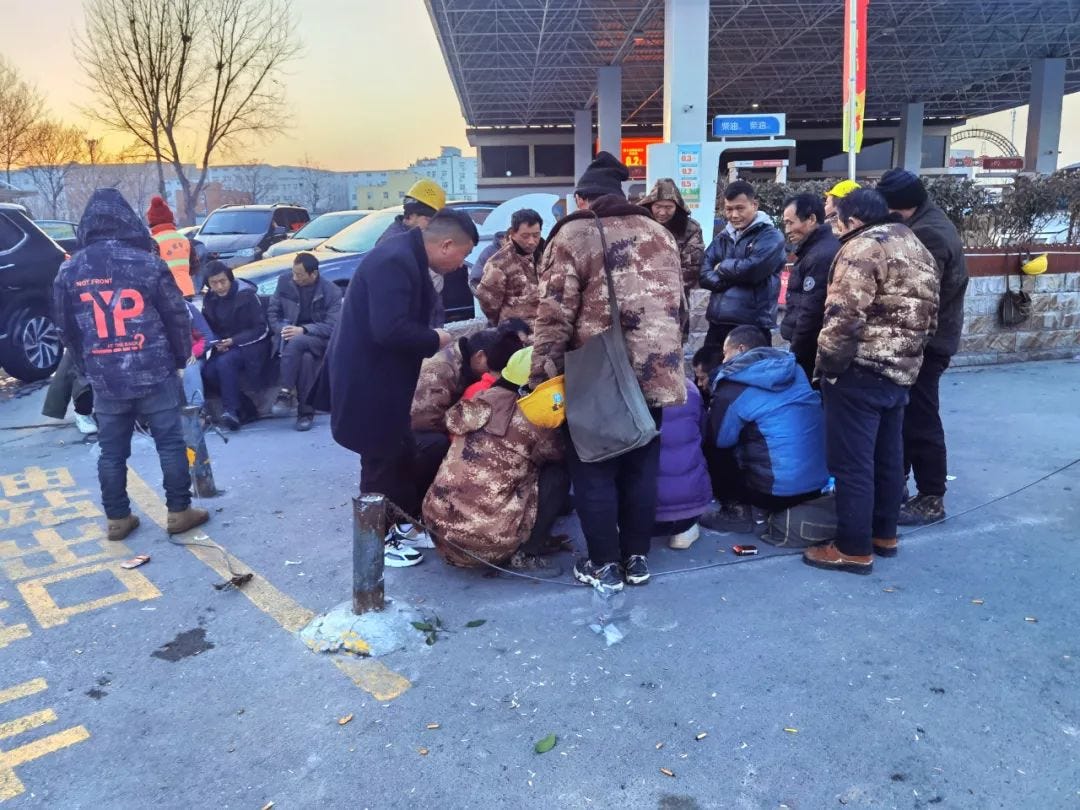Migrant Workers Waiting for Work by the Roadside in the Early Morning
Yicai reports from central China's largest haven for casual labor.
Below is a story by Yicai, the financial news arm of Shanghai Media Group, one of China's largest state-owned media conglomerates, published on Wednesday, Jan. 10. The author is Yicai reporter 马纪朝 Ma Jichao.
In the dim, early hours, the Yicai reporter journeyed alongside the interviewee to the bustling crossroads of Zhengxin Road and Yutong Road in Zhengzhou, Henan Province. There, a multitude had already assembled, many donning safety helmets as if in silent solidarity.
凌晨路边等活的农民工
Migrant Workers Waiting for Work by the Roadside in the Early Morning
Before the clock struck 4 AM, Zhang Zhong rose from his bed. A sense of urgency tinged his voice, "I must hurry, or all work will elude me," he whispered, vanishing into the dawn. His destination was the 刘湾劳务市场 "Liuwan Labor Market," Zhengzhou's largest haven for casual labor.
Awaiting Jobs in the Early Hours of the Day
As the Yicai reporter shadowed Zhang Zhong to the intersection in Zhengzhou City, Henan Province, he discovered a throng of people, a sea of safety helmets amongst them. Known as "Liuwan Labor Market," this area swells with migrant workers seeking their day's toil as early as 4 or 5 in the morning. Liuwan Village, lying across the street and under the governance of Zhengzhou's 十八里河办事处 Shibalihe Office, has become a magnet for workers like Zhang Zhong, who traverse China in pursuit of work.
To ease their financial burdens, Zhang Zhong shares a modest room with fellow villagers, his portion of the rent a mere sliver above 100 yuan ($14) out of the 500-plus yuan monthly total. Some construction labor subcontractors, seeking convenient recruitment, have even established new companies and offices in the village.
Affordable lodging and the promise of daily wage settlements draw more laborers to the Liuwan Labor Market.
Villagers recounted the market's organic inception around 1983, birthed from its logistical convenience for contractors to gather and disperse workers. Gradually, its renown grew, transforming it into Zhengzhou's largest casual labor market, primarily for construction workers.
A traffic police officer, on duty in their early morning duty, informed the reporter that the true "Liuwan Labor Market" had shifted southward to the Henan Construction Workers Labor Market (known as the "New Market"). Yet, many workers still cling to the roadside, preferring its familiar uncertainty over the sprawling, 100-acre expanse of the New Market. With dense vehicle traffic and clusters of workers, the Zhengzhou Fourth Traffic Police Brigade of Zhengzhou is on high alert for potential traffic accidents, positioning officers in these early hours.
Zhang Zhong also noted that many construction sites lay dormant in the cold, heralding the off-season for migrant workers. Yet, daily, around five to six thousand souls congregate in this market.
"It's fewer than in years past," observed Zhang Zhong, a decade-long patron of the Liuwan Labor Market. In times of peak construction demand, this place once teemed with over 20,000 workers each day. The Zhengzhou Fourth Traffic Police Brigade estimates pedestrian traffic at the intersection peaks at three to four thousand around 4 to 5 AM, occasionally surging above ten thousand.
A minivan pulled up, and a foreman, wrapped in a down jacket, beckoned to the crowd, "Seven people, simple tasks, 130 yuan ($18) for the day." Zhang Zhong hastened towards the van but emerged less than three minutes later, his expression etched with disappointment. The job required insulating the exterior walls of a 33-story building, a precarious dance atop a basket, passing rock wool boards for insulation. "The biting cold, the dizzying heights; a misstep could mean death or crippling injury," he thought. With two children back home, one in middle school and the other in kindergarten, Zhang Zhong refused to gamble with fate.
The van, now full, disappeared into the morning.
Another vehicle arrived, its foreman's call swiftly filling its seats with workers, the day's verbal labor contracts sealed. Those aboard would toil for nine hours, receiving their wages at day's end, only to be returned to this very intersection.
Feeling the Real Estate Ups and Downs
Why do these laborers, braving daily peril at this dangerous crossroads, eschew long-term employment at construction sites?
The specter of unpaid wages looms large. Many, including Zhang Zhong, bear scars of deceit, their labor exploited by contractors or subcontractors without compensation.
A year prior, Zhang Zhong had devoted nearly half a year to a construction site at the new district of Zhengzhou University Second Affiliated Hospital, entrusting a foreman, only to be left bereft of over 20,000 yuan in wages, a sum still unrecovered. This betrayal has led him back to the immediacy of Liuwan Labor Market's daily settlements.
The labor market's allure lies in its promise of immediate pay, a stark contrast to some construction sites that delay settlements until year's end. Here, these workers, jestingly dubbing themselves the "assault team," stand ready to tackle urgent tasks, their demands for daily tasks and settlements a testament to their resilience.
Yet, on January 2nd, Zhang Zhong, who had been awake since before 4 AM, endured the piercing cold roadside until 6 PM without "selling" his labor.
As evening approached, Old Li, a familiar face, disembarked from a minivan, tools in hand. "Why are you still here?" Li inquired, surprised.
"I've been standing all day without work," replied a disheartened Zhang Zhong, inquiring about joining Li at his construction site the next day. Alas, Li conveyed that despite his own meager earnings of 130 yuan a day, the site was not seeking additional hands.
"130 yuan a day was once laughable," Li said with a self-deprecating chuckle, lamenting that even such scant pay is now elusive, the opportunities limited to those under 60 years old. Those above 60, resigned to their fate, are offered a paltry 80 to 100 yuan, take it or leave it.
Zhang Zhong confirmed Li's sentiments to the Yicai reporter. In better years, skilled laborers like steelworkers, welders, and carpenters commanded up to 350 yuan daily on construction sites. Now, even these skilled hands find their wages halved to 180 yuan. Li said the reference to "better years" harkens back to the heyday of the real estate market.
As a bastion for migrant workers, China's construction industry has, over two decades, provided sustenance for tens of millions. This industry, fueled by the real estate and major infrastructure boom, has been a cornerstone of their livelihood.
The National Bureau of Statistics' "2022 Migrant Worker Monitoring Survey Report" said that in 2022, China had 295.62 million migrant workers, with 17.7% engaged in construction. This translates to at least 52 million individuals dependent on this sector.
Yet, as the real estate market adjusts, once powerhouse companies struggle for survival, their diminished construction rates and sales sending ripples down to the workers at the supply chain's base.
Short on Money
Zhang Zhong, a veteran of over 20 years in Zhengzhou's construction sites, now burdened with the responsibility of a wife and children, once aspired to elevate his family's life. Now, he grapples with sustaining his own existence.
"Behold, this is all I possess," he lamented, revealing a meager 87.12 yuan in his WeChat wallet. Without work tomorrow, even sustenance becomes a looming challenge. Where have the earnings of his years vanished? Portions whittled away on a wedding dowry, a home, a car, and the needs of his two children.
For the first half of 2023, Zhang Zhong had amassed over 30,000 yuan, dreaming of starting a small venture back home during the New Year. However, his father's stroke and subsequent hospitalization drained these savings on medical bills.
The latter half of the year, marked by scarce work, saw any income quickly transferred to his wife for domestic needs. The chat records with his wife, perused by the reporter, were a ledger of “red packet” transactions, each ranging from 100 to several hundred yuan.
Zhang Zhong's plight is not solitary. In the New Market's row of stark shacks, the reporter encountered Old Zhao from Shangqiu, who had endured over a week in a frigid shack, rented for 10 yuan a day, without securing work. He planned to leave at 5 PM for a night shift at a nearby express sorting center, earning 130 yuan.
"In such cold, I would have returned home for the New Year," Zhang Zhong mused, his gaze drifting to his fellow laborers, also awaiting roadside opportunities. "You see, not only have I stayed, but so have they; we're all desperately short on money."
The night's embrace deepened, its somber shadow lingering over the world. Migrant workers fortunate enough to find work in the early hours were slowly reclaimed by their foremen. Those less fortunate, their hearts still hopeful, lingered, hesitant to depart. Amidst this tableau of quiet desperation, some, seeking solace, gathered in small clusters, cards in hand, their quest for labor unrelenting. Having missed the day's chances, they now placed their fragile hopes on the night.
Yet, for Zhang Zhong, the ordeal proved too much to bear. Hunger and pain wracked his body, the prospect of the night shift a mountain too steep to climb.
Decades of toiling at construction sites had etched a map of hardship into his very bones. Each time he bent over, he felt as if his body were on the brink of collapse. Slightly stooped and moving with a tremulous uncertainty, he traversed the moonlit path back to the modest room he shared with his fellow laborers, a lone figure swallowed by the night's somber embrace.
He shied away from conversations about returning home for the Lunar New Year. His heart was torn between two profound longings: the fervent hope of securing work to gather earnings in the festive tide of the Spring Festival and the deep-seated yearning for his family – his wife and children, with whom the sweet reunion had been an elusive dream, suspended in the mists of time.
Life as a Migrant Food Delivery Rider in Shanghai
Pekingnology often delved into grand and overarching themes, often navigating the complex terrains of policy and abstract concepts. Today, let’s detour to zoom in on something distinctly more microscopic. Recently, a video on China's popular social media platform, Douyin, the Chinese mainland sister of TikTok, received an impressive 366,000 likes, 158,00…
Leading professor calls for massive govt subsidy to families at key forum
Zhang Jun is Distinguish Professor of Humanities and Social Sciences, Dean of the School of Economics, and Director of the Research Institute of Chinese Economy at Fudan University. He delivered a keynote speech titled 让中国家庭有更稳定的消费能力 "Enable Chinese Families More Stable Spending Power" in the 拓展消费新场景 "Exploring New Consumption Scenes" session of the 经济峰会…








